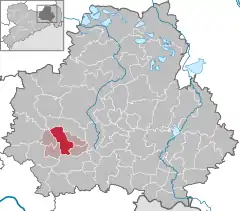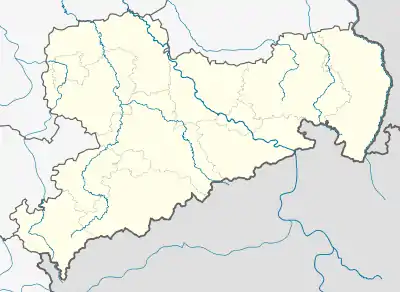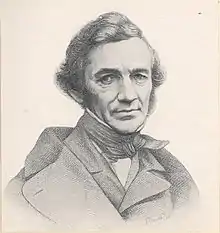Pulsnitz
Pulsnitz (German: [ˈpʊls.nɪt͡s] (![]() listen); Upper Sorbian: Połčnica) is a town in the district of Bautzen, in the Free State of Saxony, Germany. It is situated on the small river Pulsnitz, 11 km southwest of Kamenz, and 24 km northeast of the centre of Dresden.
listen); Upper Sorbian: Połčnica) is a town in the district of Bautzen, in the Free State of Saxony, Germany. It is situated on the small river Pulsnitz, 11 km southwest of Kamenz, and 24 km northeast of the centre of Dresden.
Pulsnitz | |
|---|---|
 New Palace in Pulsnitz | |
 Coat of arms | |
Location of Pulsnitz within Bautzen district  | |
 Pulsnitz  Pulsnitz | |
| Coordinates: 51°10′54″N 14°0′47″E | |
| Country | Germany |
| State | Saxony |
| District | Bautzen |
| Municipal assoc. | Pulsnitz |
| Subdivisions | 5 |
| Government | |
| • Mayor | Barbara Lüke (Ind.) |
| Area | |
| • Total | 26.72 km2 (10.32 sq mi) |
| Elevation | 290 m (950 ft) |
| Population (2019-12-31)[1] | |
| • Total | 7,468 |
| • Density | 280/km2 (720/sq mi) |
| Time zone | UTC+01:00 (CET) |
| • Summer (DST) | UTC+02:00 (CEST) |
| Postal codes | 01896 |
| Dialling codes | 035955 |
| Vehicle registration | BZ |
| Website | www.pulsnitz.de |
Pulsnitz became famous for its Pfefferkuchen, a type of Christmas cookie, when in 1558 the bakers of Pulsnitz received permission to bake them. Today there are still eight Pfefferküchlereien bakeries. In 1745 the Pfefferküchler Tobias Thomas was known to be practising his craft in Pulsnitz as well as in Thorn, Prussia now Toruń, Poland, where the famous Thorner Kathrinchen were made. Pulsnitz is informally known as Pfefferkuchenstadt meaning "Gingerbread Town".
The first Protestant missionary to arrive in India, Bartholomäus Ziegenbalg was born in Pulsnitz on July 10, 1682.[2]
Gallery
 Town hall
Town hall Memorial for Ernst Rietschel
Memorial for Ernst Rietschel Pulsnitzer Spitzen
Pulsnitzer Spitzen Pulsnitzer Pfefferkuchen
Pulsnitzer Pfefferkuchen Post milestone from 1731
Post milestone from 1731
Sons and daughters of the city

- Bartholomäus Ziegenbalg (1682-1719), first Protestant missionary and Indian linguist
- Ernst Rietschel, one of the most important sculptors of his time
- Julius Kühn, an important agricultural scientist, he founded the first agricultural institute to be taken seriously at a German university
- Curt Haase, politician (NSDAP)
- Klaus Staeck, graphic artist
- Linda Wenzel
References
- "Bevölkerung des Freistaates Sachsen nach Gemeinden am 31. Dezember 2019". Statistisches Landesamt des Freistaates Sachsen (in German). July 2020.
- Bautz.de
External links
- (in German) Official website